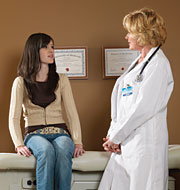Tips for Teens with Diabetes: Dealing With the Ups and Downs of Diabetes
Download This Publication (NDEP-81)
Want this item now? Download it here:
Print this Publication (NDEP-81)
To print large quantities of a publication, you can order printer-ready files for $20 each by calling 1-800-860-8747.
Order this Publication (NDEP-81)
To order a copy of this publication, select quantity and "add to cart".
- Hide order info
-
Single copies up to 10 copies, free. Each additional package of 10, $2. Limit 100 copies (10 packages).

This tip sheet provides useful information about diabetes and encourages teens to take action to manage their disease for a long and healthy life.
Last reviewed: 02/02/2012
Feelings

Many teens like you deal with diabetes everyday. Most of the time, it’s not a problem, you just deal with it. But sometimes, you may just want it to go away.
Do you ever…
- Ask “why me?”
- Think you’re the only one who feels sad, mad, alone, afraid, or different?
- Get tired of others teasing you if you are overweight?
- Blame yourself or your family for your diabetes?
All of these feelings are normal. Lots of teens who have diabetes feel the same way. It’s okay to get angry, feel sad, or think you’re different every now and then. But then you need to take charge and do something to feel better.
Everyone feels down sometimes. You are not alone.
Still down?
Reach out for help. Talk to someone in your family or where you worship, a friend, a school counselor, teacher, or your doctor or diabetes educator. It might help to write down your feelings in a journal. If you still feel down or sad, ask your parents to help you find a counselor.
It is okay to ask for help.
Speak up

There are many people who care about you and want to help you stay healthy and happy. Your health care team (diabetes educator, dietitian, doctor, nurse, psychologist, and social worker) can help you learn how to make healthy food choices, be more active, and feel good about yourself. Stay in touch with them. Let your health care team know how you feel and what you need.
Let your school know what’s up
You or your parents need to give the school nurse, teacher, or other school staff a copy of your diabetes care plan. Let people at your school know you have diabetes and that you need to eat healthy foods, eat your meals, take your medicine on time, and be physically active.
Don’t let diabetes stop you from joining in school activities. You can do all the things your friends do and then some!
Mom, Dad, other family members, get with it!
It’s easier to manage diabetes when the whole family works at it with you. So…
- Ask your family to choose the same healthy foods you eat—fruits and vegetables; whole grain breads; and low-fat meats, milk, and cheese. Ask them to keep healthy foods in the house and not tempt you with cookies, cake, candy, or regular soda.
- Get everyone moving by being more physically active. Play hard. Shoot hoops, throw a ball, ride bikes, or go for a walk — together. Being active can also help you relax and lower stress.
What’s healthy for you is healthy for everyone in your family.
Want to meet other teens who feel like you do?

- Programs and support groups for teens with diabetes can be found in clinics, health centers, or hospitals. Ask your diabetes educator or doctor for help to find one that works for you.
- Head to a diabetes or weight loss summer camp. You will do all the things that other campers do: swim, hike, dance, and more. But the best part is that everyone has diabetes or is there to lose weight, just like you. Some groups may have funds to help pay for teens to attend summer camps.
- Find a pen pal or email buddy. Sometimes it is good to share how you feel about having diabetes with someone else.
- Check out the resources at the end of this tip sheet.
Still my friend?
Ever worry that your friends may have wrong ideas about diabetes?
- Tell them that you have diabetes. You don’t have to keep it to yourself. The more people know about diabetes, the more they will understand. Explain that your body needs help to use the food you eat.
- Be sure everyone knows that no one can catch diabetes from you.
- Good friends help each other out. They understand your needs and offer support. Hang on to friends who help you make healthy food choices when you are eating out.
Ever have kids make fun of you about your diabetes or weight?
Teasing hurts. The best thing is to just walk away.
talk to someone…write down your feelings in a journal…write to a pen pal…email a buddy…stay in touch
Take Action!

It’s time for YOU to do something about your diabetes care.
- Set goals for what you will do. Start small and work your way up. For example: “I will cut down on regular soda and drink water instead.” When that’s going well…take the next step. Add another goal—“I will dance or bike ride a couple of times a week.” Then add a new goal—“I will eat smaller servings of cookies, burgers, and fries.”
- Try to make each new goal just a bit harder. After you shoot hoops twice a week, try adding another activity on three other days. Raise the goal until you reach a level that works for you.
- Avoid goals that will be too hard to meet. For example, rather than saying you’ll never eat a burger or a candy bar again, say you’ll only eat one a week.
- Tell your family or friends about your goals. Maybe they’ll be active with you or help out some other way.
- Reward yourself when you reach each goal. Keep in mind that rewards can be anything—not just food. You do not have to reach all your goals at once. Start with one or two, then add more.
Write down your top three goals—use the chart on the back page!
Write down your Top 3 Goals
Choose goals that you really can meet. Put in the date when you set the goal and when you met it.
Got it.
Take it one step at a time. Make healthy food choices, be more active, and work towards a healthy weight. Soon you’ll see progress and feel great.
Application Required
PDF files require the
free Adobe Acrobat Reader![]() application for viewing.
application for viewing.
WMV is Video file in Windows Media Player format. Download the free Windows Media Player![]() application for viewing.
application for viewing.
MP3 is Music file. Download the free Windows Media Player![]() application for viewing.
application for viewing.
All our publications are copyright-free. Please duplicate and distribute as many copies of these materials as desired. Online information may be more recently updated than printed materials.
Attention visually impaired visitors: To use common screen
reading programs with PDF documents, please visit Accessibly Resource Center![]() , which provides a set of free tools that convert PDF
documents to simple HTML or ASCII text.
, which provides a set of free tools that convert PDF
documents to simple HTML or ASCII text.
